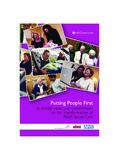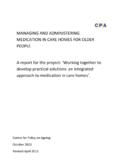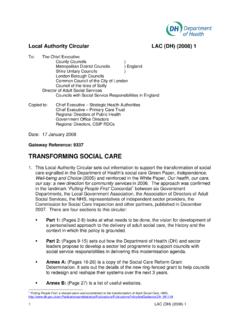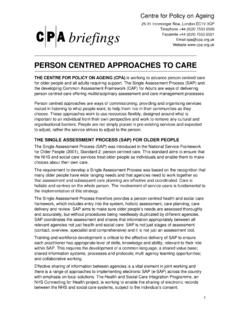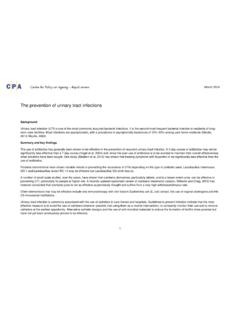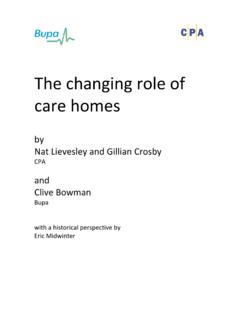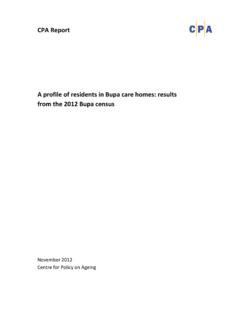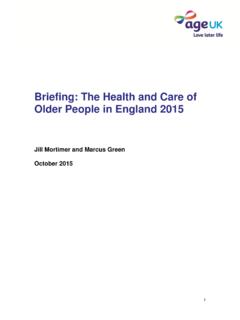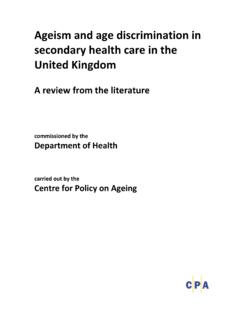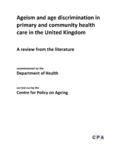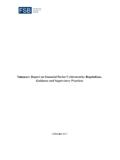Transcription of The myth of the baby boomer - CPA
1 The myth of the alliance baby boomer Who are the baby Introduction boomers? The Ready for Ageing Alliance is a group of major national The term baby boomers charities, set up to urge the Government and all political emerged in the US to describe parties to face up to the challenge and opportunity of our the group of the population born rapidly ageing society. between the end of the second world war and the early 1960s, The richest, most powerful generation that ever lived is embarking on a comfortable retirement. But why There has been less consensus does it feel like they've pulled up the ladder with them? . in the UK as to who the baby BBC1. boomers actually are. There Across the UK and internationally, there is a growing media is some debate about the perception that all boomers have it good at the expense accuracy and relevance of the of the younger The term baby boomer is term in the UK, partly because increasingly used as a term of abuse.
2 The picture often we had two not one post war painted is one of a group who are ageing well. They are baby booms. wealthy demanding consumers who are demanding Government resources and stealing from the young. But painting this picture has the potential to result in worse outcomes for both young and old. We have produced this briefing to challenge the sometimes lazy assumptions being made about the group of our population described as boomers . This short briefing does not seek to compare young with old. We are simply highlighting that amongst the boomer population there is significantly more diversity than is often recognised. For the purpose of this report we adopt the American definition and consider boomers as those aged broadly between about 55 and 70 today. 1. life-expectancy-at-birth-by-national-dec iles-of-area-deprivation--england/2011-1 3/index. htm 2. the-case-against-the- baby -boomers/263291 /; How baby boomers screwed their kids.
3 And created millennial impatience ers_screwed_their_kids_%E2%80%94_and_cre ated_millennial_impatience/. Why do we care? Diversity among Our ageing society presents major challenges and the boomers opportunities for our society and our economy. Yet too much of the debate assumes that all older people are the same. It is vital that policymakers do not make the mistake Male boomers in the UK can of falling into the trap of designing policy based on an expect to live another 18-20. image of ageing which is not representative. years in good health. For females, it's about 20-224. If our society is to become Ready for Ageing , we must ensure that the diversity of ageing is Fewer than half (48 per not ignored. It is important that we embrace and cent) aged 55-645 own their understand ageing, rather than deny it. property outright and nearly We have painted a picture below of a boomer a quarter (24 per cent) are still generation which is more diverse than is often seen.
4 Renting. But, if we are to ensure that future generations experience ageing better, policy makers cannot use use the internet. the myth of the baby boomer as an excuse for 887,000 never been online6. inaction. At the last Census, there were It is in the interests of both younger and older people that we find a way of ensuring more older people over 566,000 baby boomers of today and tomorrow retire well. non-white ethnicity (over six and a half per cent of all aged Inequalities across 55-69 in England and Wales)7. all ages matter most: 49 per cent of baby boomers in England are men. The inequalities that really matter are those which can affect someone of any age: inequalities in health, Over 52,000 baby boomers income and wealth, educational opportunities, (55-69) describe themselves housing, and the ability to contribute and get ahead in work. as gay or lesbian. Inequalities in health3.
5 Males in the most deprived areas could expect to live years in good' health, compared with males in the least deprived areas who could expect to live years in good' health. And they spend a smaller proportion of their shorter lives in good'. health ( compared to ). Females in the most deprived areas could also expect to live less of their lives ( years) in good' health, compared with females in the 4. Depending on their current age. Estimates from ONS Health Expectancies 2009-11 least deprived areas ( years). They could also expect to spend a smaller proportion of their 5. English Housing Survey 2013-14, annex Table https://. shorter lives in good' health ( compared 2013-to-2014-headline-report to ). 6. Figures are again for 55-64: Internet access Quarterly Updates q1 2014 (Latest available), ONS m%3A77-336652. 3. 7. Census 2011 analysis by Age UK. in-healthy-life-expectancy-at-birth-by-n ational-deciles-of-area-deprivation--en- gland/2011-13 The claim: the baby Boomers got a free university education The reality: just over 13% of those aged 65-69 have a degree While there were no fees for those who went to university in the 60s and 70s participation rates were considerably lower than today, meaning that far fewer people enjoyed this privilege than among today's young people.
6 Among 55-64 year olds, just under 20 per cent have a degree as their highest level of qualification. This proportion declines still further among 65-69 year olds, among whom just over 13 per cent attained a Furthermore, older people are more likely to have either no qualifications or only those of a low level. The claim The baby Boomers can look forward to security in retirement thanks to their generous pensions . The reality: Nearly 2 million people aged 55-64 do not have any private pension savings As would be expected, on average those in the 55-64 year age bracket have the highest wealth they have built up assets over their working life but generally have not started to draw on these for their retirement. 28% of people in GB aged 55-64 have no private pension wealth at all (19% of men and 37%. of women)9. For women in this age group the median private pension wealth is 26,200.
7 This means half of women in this group have pension savings of 26,200 or less and the other half have that amount or more. A pension fund of 26,200 would provide a lump sum of around 6,550 plus a fixed income of a little over 1,000 a year to someone approaching 65 now. Amongst the 55-64 age cohort, total median pension wealth is 135,900 after excluding all individuals who have saved nothing. Using the L&G annuity calculator in 2014, ILC-UK. projected that that could deliver an annual income of 7,638 - woefully short of what is needed to secure an adequate income in 37% of women amongst the 55-64 age group have no private pension wealth compared to 19% of The housing wealth held by older people in England is However, this is not evenly distributed nor easy to draw down. Looking across all older people, there are an estimated million people with assets of greater than 100,000 but incomes of less than 15,000.
8 ILC-UK research on mortgage debt published in 2013 revealed that two in ten households aged 60-64 year olds13 had outstanding mortgage borrowing on their main residence. 60-69. year old households with mortgage debt still owed on average over 50,00014. 8. Age UK analysis of Understanding Society Wave 3, 2012/13 data (UK). 9. Wealth and Assets Survey Chapter 6, Private Pension Wealth 2010-12, table ONS 2014. A median of 26,200 means that half have no private pension wealth or less than this level and half have more. (GB) Plus mid-2013 population estimates for Great Britain, ONS 2014 (base 7,097,914 aged 55-64). 10. ILC-UK Four things we learnt from the Wealth and Assets Survey, 2014 four_things_we_learned_from_the_wealth_a nd_assets_survey 11. ILC-UK Four things we learnt from the Wealth and Assets Survey, 2014 four_things_we_learned_from_the_wealth_a nd_assets_survey 12. IThe UK Equity Bank - Towards income security in old age, (2014) ILC-UK.
9 13. By age of household reference person or their partner. 14. Housing/mortgage debt report. The Claim: baby Boomers are so well off they can afford to retire early . The Reality: More than seven out of ten people in their 50s and early 60s are in work While some people in this generation are able to retire early, the vast majority (72 per cent) of people aged between 50 and State Pension age are in employment. A further 14 per cent are either inactive because of health reasons, or because they are caring for family or looking after their home. Only 7 per cent are inactive because they have retired and even for these people, it is far from clear that they have stopped working because they are financially The Pensions Policy Institute calculated that half of those aged 50-state pension age age would have to keep working for at least five years past their State Pension age in order to maintain their standard of living in retirement16.
10 The Claim: the baby boomers bought cheap housing and are now sitting on a fortune The reality: Not all baby boomers are homeowners and those who bought their homes had to pay high interest rates Among households headed by someone aged 55-6417: Just under a half (48 per cent) own their property outright. Nearly a quarter (24 per cent) are renting. Ten years earlier the proportion of tenants in this age group was lower at 18 per cent. While there are people who have benefited greatly from rises in house prices the price of lending was high often 10 per cent or more - during the 1970s and 1980s. One in ten of those aged 65+ still have outstanding mortgage borrowing. 40% of those aged 75+ who still have a mortgage, have an unlinked interest-only Table 1 Amount owed and percentage loan-to-value among older households with any outstanding mortgage borrowing on the main residence, by age of HRP or their partner Amount Amount Age of HRP outstanding outstanding Loan-to- Unweighted or partner (Mean ) (Mean ) value (%) base 50 to 54 72,000 50,000 33 916.
